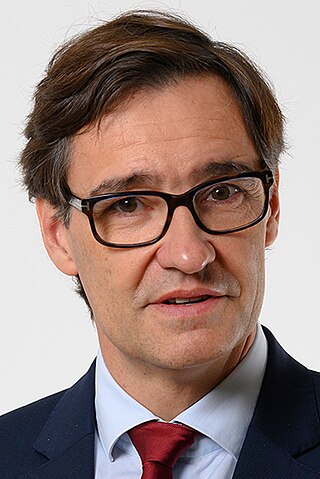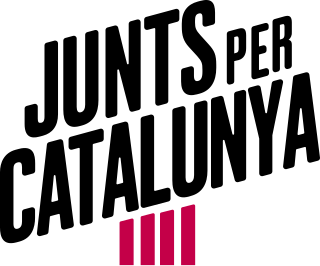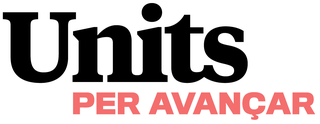
The Democratic Convergence of Catalonia, frequently shortened as Convergence was a Catalan nationalist, liberal political party in Catalonia (Spain), currently still existing without any political activity.

The 2015 Catalan regional election was held on Sunday, 27 September 2015, electing the 11th Parliament of the autonomous community of Catalonia. All 135 seats in the Parliament were up for election. This was the third regional Catalan election in only five years, after the 2010 and 2012 elections and the first one in over 37 years in which Democratic Convergence of Catalonia (CDC) and Democratic Union of Catalonia (UDC) ran separately, after the dissolution of Convergence and Union (CiU) in June 2015 over disagreements on the coalition's separatist turn.

Democrats of Catalonia is a Christian-democratic, pro-Catalan independence political party in Catalonia founded in July 2015 from a split in Democratic Union of Catalonia (UDC). Its members included the then-Speaker of the Catalan parliament Núria de Gispert and former UDC president Joan Rigol. The party has received accusations of xenophobia for its controversial statements against Spaniards, and for having ties with xenophobic organizations.

Junts pel Sí was a Catalan electoral, political and parliamentary alliance focused on achieving the independence of Catalonia from Spain. Established ahead of the 2015 Catalan regional election, it was formed by Democratic Convergence of Catalonia (CDC), Republican Left of Catalonia (ERC), Democrats of Catalonia (DC), Left Movement (MES) and Independence Rally (RI.cat), as well as a number of independent personalities from pro-independence sectors of civil society, including the pro-independence organizations Catalan National Assembly, Òmnium and the Association of Municipalities for Independence. The Popular Unity Candidacy (CUP) had been invited to participate in the alliance, but refused to do so and ran on its own instead, citing its disagreement with the presence of politicians in the list.

The 2017 Catalan regional election was held on Thursday 21 December 2017 to elect the 12th Parliament of the autonomous community of Catalonia. All 135 seats in the Parliament were up for election. The election was called by Spanish prime minister Mariano Rajoy after the invocation of Article 155 of the 1978 Spanish Constitution to enforce direct rule in Catalonia and the subsequent dismissal of the Catalan government under President Carles Puigdemont. The three pro-Catalan independence parties won a slim majority of parliamentary seats, claiming 70 out of 135, but fell short of a majority in the popular vote by securing 47.6% of the share.
The Catalan European Democratic Party, initially branded as the Catalan Democratic Party, was a liberal political party in Spain that supported Catalan independence. The party was founded in Barcelona on 10 July 2016 and dissolved on 28 October 2023. PDeCAT was regarded as the successor party to Democratic Convergence of Catalonia (CDC), which for most its history was a constituent party of the Convergence and Union (CiU) political formation.
The Greens–Green Alternative is a political party based in Catalonia, founded in September 1999 by former members of The Greens–Ecologist Confederation of Catalonia (EV–CEC), after the party had split in March 1998 over the type of relationship to establish with the newly-autonomous Initiative for Catalonia (IC).

The 2021 Catalan regional election was held on Sunday, 14 February 2021, to elect the 13th/14th Parliament of the autonomous community of Catalonia. All 135 seats in the Parliament were up for election.

Together for Catalonia was an electoral and parliamentary alliance in Catalonia, registered as a political party in the interior ministry in July 2018, originally envisaged as a platform comprising the Catalan European Democratic Party (PDeCAT), successor of the late Democratic Convergence of Catalonia (CDC), and independents and centered around the candidacy of former Catalan president Carles Puigdemont ahead of the 2017 Catalan regional election. Some of these independents went on to form the Action for the Republic (AxR) political party, which is also part of the alliance in the Parliament of Catalonia.

Catalunya en Comú–Podem, alternatively spelled out as Catalunya–En Comú Podem, was a left-wing and self-governance electoral and parliamentary alliance in Catalonia formed by Catalunya en Comú and Podem ahead of the 2017 Catalan regional election. It was the successor of the 2015 Catalunya Sí que es Pot alliance, and its leading candidate was Xavier Domènech.

United to Advance is a Catalan centrist and Christian democratic political party founded in June 2017 by former members of the defunct Democratic Union of Catalonia (UDC) and non-independentist Catalan nationalists. The party defines itself as moderate Catalan nationalist and opposes Catalan independence.

The 12th Parliament of Catalonia was the meeting of the Parliament of Catalonia, with the membership determined by the results of the 2017 regional election held on 21 December 2017 after its dissolution on 27 October in application of direct rule. The parliament met for the first time on 17 January 2018.

The National Call for the Republic was a pro-independence, big tent political party in Catalonia. It aimed at uniting pro-independence political parties and organisations throughout Catalonia towards the common goal of establishing a Catalan Republic, regardless of political ideology. Its members included both independent figures from the civil society and aligned to the Together for Catalonia (JxCat) alliance—such as Quim Torra or Jordi Sànchez—as well as prominent members of the Catalan European Democratic Party (PDeCAT), among others: former Catalan president Carles Puigdemont, former regional ministers Josep Rull, Jordi Turull and Laura Borràs or party vice-president Míriam Nogueras.

Marta Pascal Capdevila is a Spanish politician, a Senator of the Parliament of Catalonia. From July 2016 to July 2018, she was general coordinator of the Catalan European Democratic Party (PDeCAT). From October 2012 to February 2015, she was president of the Nationalist Youth of Catalonia, and from July 2015 until its dissolution in July 2016 she was the spokesperson for the Democratic Convergence of Catalonia (CDC).

Míriam Nogueras Camero is a Spanish businesswoman and politician from Catalonia who serves as Member of the Congress of Deputies of Spain.
The Nationalist Party of Catalonia is a Catalan nationalist and liberal political party in Catalonia. The party was established on 12 May 2020 by former Catalan European Democratic Party (PDeCAT) coordinator-general Marta Pascal. It held its founding congress on 27 June 2020, under a political manifesto in which they announce their commitment to an agreed referendum as the solution for the issue of Catalan independence.

Action for the Republic is a Catalan nationalist and progressive political party in Catalonia, founded by independent deputies of the Parliament of Catalonia grouped into the Together for the Republic internal current within the Together for Catalonia (JxCat) alliance. The party defines itself ideologically as independentist, republican, ecologist, feminist and progressive, and has the Dutch Democrats 66 party as its ideological referent. It advocates for a "broad republican and patriotic front" together with other pro-independence parties while supporting "a policy of rupture".

Convergents is a Catalan political party founded in November 2017 by former regional justice minister in Artur Mas's second government Germà Gordó, who had left the Catalan European Democratic Party (PDeCAT) in June 2017. The party includes former Democratic Convergence of Catalonia (CDC) members Teresa Maria Pitarch and Sílvia Requena.

The 2024 Catalan regional election was held on Sunday, 12 May 2024, to elect the 15th Parliament of the autonomous community of Catalonia. All 135 seats in the Parliament were up for election.
Centrem is a Catalan nationalist centre-right political party in Catalonia, announced on 11 January 2022 by former Catalan European Democratic Party (PDeCAT) secretary-general Àngels Chacón, in an attempt to unify the parties in the political space left by the dissolution of Convergence and Union (CiU), and the ascendence of Catalan President Carles Puigdemont on the Together for Catalonia party founded in July 2020, which emerged from an homonymous 2017 electoral alliance. The party is supported by Chacón's former party, the PDeCAT, as well as Convergents (CNV), Democratic League (LD) and Free (Lliures), and has announced that it will contest the 2023 Spanish local elections in Catalonia. The Nationalist Party of Catalonia (PNC) of former PDeCAT coordinator-general Marta Pascal has openly rejected joining the Centrem platform.















